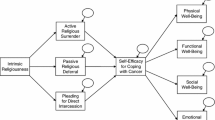Abstract
The authors studied the religious response to cancer in a group of hematology/ oncology-clinic patients. Method: Patients (N = 45) were surveyed with a self-report questionnaire. Five items were designed to reflect the five major categories of theodicy or modes of reconciling suffering with a morally good God. Results: Of the 45 patients, in response to their illness, 67% (N = 30) increased amount of prayer, 51% (N = 23) gained faith, and 16% (N = 7) increased the frequency of church attendance. The majority of patients across all levels of religious belief endorse a theodicy that claims God has a reason for their suffering, but this reason cannot be explained or understood. Conclusions: Religious cancer patients intensify their religious belief and practice in response to their illness. Despite the elusiveness of an explanation for their suffering in religious terms, patients remain confident in their faith.
Similar content being viewed by others
References
Waldfogel, S. Wolpe P.R., “Using Awareness of Religious Factors to Enhance Interventions in Consultation-Liaison Psychiatry.” Hospital & Community Psychiatry 1993; 44, pp. 473–477.
Muthny, F.A. Bechtel, M. Spaete, M., “Lay Etiologic Theories and Coping with Illness in Severe Physical Diseases: An Empirical Comparative Study of Female Myocardial Infarct, Cancer, Dialysis and Multiple Sclerosis Patients.” Psychotherapie, Psychosomatik, Medizinische Psychologie 1992; 42, pp. 41–53.
Ginsburg, M.L., Quirt, C., Ginsburg, A.D., and MacKillop, W.J., “Psychiatric Illness and Psychosocial Concerns of Patients with Newly Diagnosed Lung Cancer.” Canadian Medical Association Journal 1995;152, pp. 701–708.
Pressman, P., Larson, D.B., Lyons, J.S., and Humes D., “Impact of Religious Belief on Psychological Distress.” Psychosomatics 1992;33, p. 470.
Voltaire, Candide. Ed. Adams, R.W. New York: W.W. Norton, 1966.
Durant, W. and Durant, A., The Age of Louis IV. New York: Simon & Schuster, 1963, p. 673.
Campbell, C.S., “Religion and Moral Meaning in Bioethics.” Hastings Center Report 1990; pp. 4–10.
Green, R.M., “Theodicy” in The Encyclopedia of Religion, vol 14. New York: Macmillan
Kreeft, P., A Summa of the Summa. San Francisco: Ignatius Press, 1990. pp. 204–207.
Willets, F.K., Crider, D.M., “Religion and Well-being: Men and Women in the Middle Years.” Review of Religious Research 1988; 29, pp. 281–292.
Zuckerman, D.M., Kasl, S.V., and Ostfeld, A.M., “Psychosocial Predictors of Mortality Among the Elderly Poor.” American Journal of Epidemiology 1984;119, pp. 410–422.
Job 9:11.
Job 38:4.
Author information
Authors and Affiliations
Rights and permissions
About this article
Cite this article
Moschella, V.D., Pressman, K.R., Pressman, P. et al. The Problem of Theodicy and Religious Response to Cancer. Journal of Religion and Health 36, 17–20 (1997). https://doi.org/10.1023/A:1027432730591
Issue Date:
DOI: https://doi.org/10.1023/A:1027432730591




